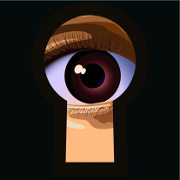 iStockphoto/Thinkstock
iStockphoto/Thinkstock
Normally only your eyes will move during rapid eye movement (REM) sleep. Your skeletal muscles muscles remain still.
This state, called sleep paralysis, protects the sleeper from moving about in ways that could be dangerous.
People who have REM behavior disorder don't enter into this state of sleep paralysis. Their sleeping experience is far from refreshing.
REM behavior disorder can be dangerous and frightening. When someone suffers from REM behavior disorder, dreams can become scripts for extreme activity.
The sleeper may run, fight, or act out their dreams in other activities that put themselves and others in harm's way. Men over the age of 60 are more often affected by this condition though it can also occur in women.
The disorder is a type of parasomnia. Parasomnias are sleeping disorders which include various abnormal sleeping behaviours such as sleep walking and even eating while asleep.
In some cases REM behavior disorder will respond to medications. Safe-proofing your bedroom can also be effective.
Benzodiazepines are a class of medication that may successfully treat the condition. The hormone melatonin is being researched as another possible treatment to normalize the sleep-wake cycle.
As reported in a Sept. 21, 2012 article on Sciencedaily.com, sleep specialist Dr. Nabeela Nasir of the Loyola University Medical Center has suggested making sleep-time safer by taking objects and furniture that might pose dangers out of the bedroom, and putting the mattress on the floor. If necessary the sleeper might consider sleeping by themselves to protect a partner.
Nasir is an assistant professor in the Department of Neurology of Loyola University Chicago Stritch School of Medicine. She is board certified in Neurology and Sleep Medicine and is a Diplomat of the American Board of Sleep Medicine.
Research from University of Toronto studied sleeping rats to gain insight into your sleeping world. This study was reported on in a July 17, 2012 article on Sciencedaily.com.
In rats, the researchers found that the combination of a couple of neurotransmitters turn off cells in the brain that lets muscles move. These neurotransmitters are glycine and gamma-aminobutyric acid, or GABA. Previously it was thought that it was only glycine which kept muscles still.
For people who have an REM sleep disorder, these findings could lead to some relief.
Not only is this situation dangerous to those who are sleeping and others who are around them, but 80 percent of people with the disorder also go on to develop a neurodegenerative illness like Parkinson's disease. Further research may reveal more about other sleep disorders as well, such as bruxism (grinding the teeth) and narcolepsy.
The study was reported in the July 18, 2012 issue of The Journal of Neuroscience. The Canadian Institutes of Health Research and the National Science and Engineering Research Council of Canada funded the research.
Sources:
Dangerous Dreaming: Kicking, Screaming and Falling out of Bed Might Be More Common Than Reported. Sciencedaily.com. Retrieved Nov. 10, 2012.
http://www.sciencedaily.com/releases/2012/09/120921111032.htm
How Muscles Are Paralyzed During Sleep: Finding May Suggest New Treatments for Sleep Disorders. Sciencedaily.com. Retrieved Nov. 10, 2012.
http://www.sciencedaily.com/releases/2012/07/120711131030.htm
Visit Jody's website and blog at http://www.ncubator.ca and http://ncubator.ca/blogger
Reviewed November 12, 2012
by Michele Blacksberg RN






Add a CommentComments
There are no comments yet. Be the first one and get the conversation started!